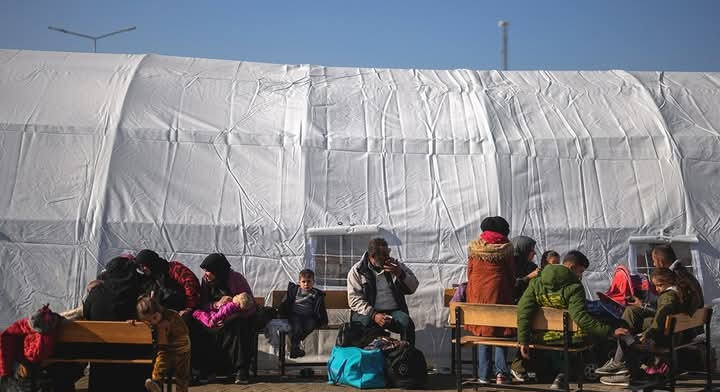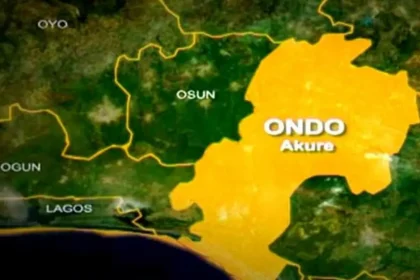By Adeyemi Adekunle
The United Nations has expressed it’s optimism for an ambitious expansion of humanitarian support in Syria, following encouraging commitments from the country’s interim government and strengthened diplomatic engagement from European nations. As Syria transitions away from a decade of devastating conflict, international support is being galvanized to address the needs of its war-ravaged population and rebuild shattered infrastructure.
During a press briefing on Tuesday, U.N. humanitarian chief Tom Fletcher highlighted recent “constructive discussions” with Ahmed al-Sharaa, the leader of the rebel coalition that now holds power. Fletcher stressed that the talks have laid the groundwork for a substantial increase in humanitarian operations across Syria.
“There is now a clear basis for scaling up critical humanitarian aid in Syria,” Fletcher said. “This includes better access through key border crossings, protection for aid workers, and fast-tracked permits that have long been a barrier to delivering life-saving support.”
A Turning Point for Syria
Syria has endured a relentless civil war since 2011, resulting in the deaths of hundreds of thousands and the displacement of over 12 million people – half of the country’s pre-war population. The conflict, exacerbated by years of international deadlock and Bashar al-Assad’s authoritarian rule, left the country divided, impoverished, and broken. However, Assad’s removal earlier this year has shifted the dynamics, offering what U.N. Secretary-General Antonio Guterres described as a “historic opportunity” for recovery.
In a statement released on Tuesday, Guterres welcomed the commitments made by Syria’s interim caretaker government, led by Prime Minister Mohammed Bashir. The promises include granting humanitarian agencies unimpeded access to conflict-affected regions, ensuring the safety of aid workers, and speeding up bureaucratic processes like visas and permits.
“As the Syrian people seize the opportunity to build a better future, the international community must rally behind them,” Guterres emphasized. “Now is the time to act, to show solidarity, and to ensure that Syrians have the resources and support they need to rebuild their lives.”
Guterres also urged donor nations and aid organizations to significantly scale up funding and operational capacity, underscoring the urgency of the humanitarian crisis.
A Shift in International Diplomacy
The U.N.’s optimism has been matched by renewed international engagement with Syria’s transitional leadership. European nations, previously reluctant to engage under Assad’s regime, are now positioning themselves as partners in the country’s reconstruction.
French special envoy Jean-Francois Guillaume, speaking during a visit to Damascus, reaffirmed France’s commitment to standing with Syrians during this crucial transitional period. Guillaume noted that France’s involvement would go beyond humanitarian aid, focusing on long-term stabilization and democratic reforms.
“We are preparing to walk alongside Syrians as they navigate this delicate phase,” Guillaume said. “Our priority is to ensure that their aspirations for peace, stability, and democracy are fully realized.”
Germany has also stepped up its diplomatic efforts, with its foreign ministry announcing the first formal talks between German diplomats and Syria’s rebel leadership. Germany, which has hosted hundreds of thousands of Syrian refugees over the past decade, is expected to play a pivotal role in supporting both the return of refugees and the rebuilding of critical infrastructure.
Meanwhile, European Union foreign policy chief Kaja Kallas highlighted the broader geopolitical significance of Syria’s transition. Kallas said the EU is already increasing humanitarian funding for Syria while exploring ways to assist the interim government in achieving stability and democratic reforms.
“This is a historic moment of opportunity – not just for Syria but for the international community,” Kallas said. “Assad proved time and again that Syria could never be peaceful, united, or stable under his rule. Now, we must seize this critical moment to support the Syrian people in their pursuit of a better future.”
The Humanitarian Crisis on the Ground
While political and diplomatic developments signal hope, the humanitarian situation on the ground remains dire. Millions of Syrians face acute food shortages, a lack of clean water, and limited access to healthcare. Cities like Aleppo, Homs, and Idlib, once vibrant urban centers, now lie in ruins, with families struggling to survive amid the rubble.
At the Oncupinar border gate near Kilis, southern Turkey, long queues of refugees were seen on Tuesday waiting to cross back into Syria. Many families expressed both hope and uncertainty about returning to their homeland.
“We have waited for this moment for years,” said Hanan Al-Sheikh, a mother of three who fled Aleppo in 2016. “But Syria is still broken. We need help to rebuild our homes, schools, and hospitals.”
Refugee returns have been a contentious issue in recent years, with humanitarian organizations warning of the risks faced by families returning to insecure regions. However, with the interim government’s commitments to improving conditions, the U.N. hopes to create a safer environment for returnees.
“The international community must prioritize the needs of returnees,” Fletcher said. “They need more than just shelter – they need sustainable livelihoods, education for their children, and access to basic healthcare.”
Challenges Ahead
Despite the optimism, significant challenges remain. Rebel factions, though unified in ousting Assad, must maintain cohesion to avoid further fragmentation. Additionally, rebuilding Syria’s economy – devastated by war, sanctions, and corruption – will require massive international investment.
Humanitarian agencies also face logistical hurdles, including repairing damaged infrastructure and ensuring that aid reaches all Syrians, especially those in remote or previously inaccessible areas.
To overcome these challenges, the U.N. has called for sustained international support and cooperation with local authorities. Fletcher emphasized that the success of Syria’s transition will depend on a collective global effort.
“This is not just about delivering aid – it’s about restoring dignity and hope to millions of Syrians,” Fletcher said. “We cannot afford to let this opportunity slip away.”
A Critical Moment
As Syria embarks on this delicate transition, the international community faces a critical test of its commitment to peace and stability in the Middle East. For Syrians, the promises of humanitarian support and diplomatic engagement offer a glimmer of hope after years of despair.
“We’ve been through so much suffering,” said Mahmoud, a shopkeeper from Homs who now lives in a refugee camp in Turkey. “All we want is a chance to rebuild our lives and give our children a future.”
The coming months will be decisive for Syria, as aid agencies, governments, and Syrians themselves work to turn this moment of hope into lasting peace and recovery. For now, the U.N.’s call for “ambitious humanitarian support” stands as a rallying cry for the world to act.




